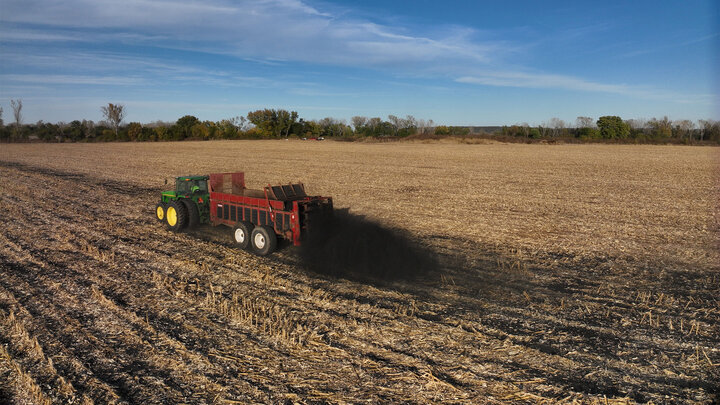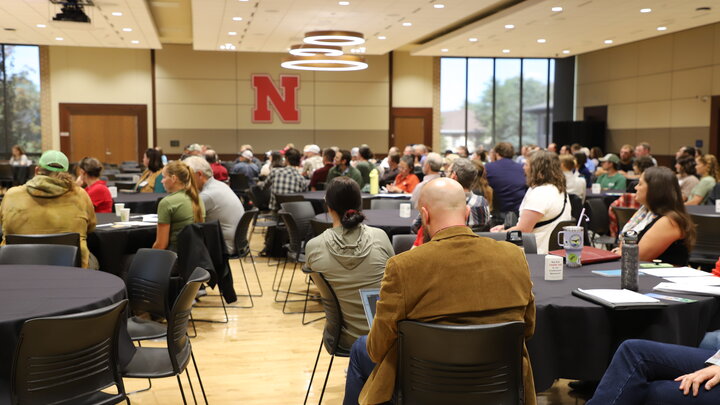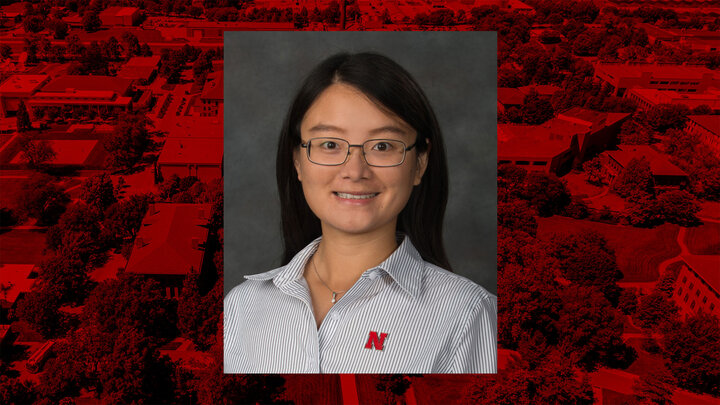Lauren Quackenbush wears many hats — farmer, consulting agronomist, soil scientist, pest control adviser, operations manager, grower relations manager and economic development coordinator. Her adaptability and passion for learning have led her to excel in every job she has taken on in her extensive career, and now she has earned herself and her research global recognition.
After graduating from her master’s program in May, Quackenbush was selected to present her master’s thesis results at the EUROSOIL conference from Sept. 8–11 in Seville, Spain. The European Confederation of Soil Science Societies holds the conference once every four years to allow the soil sciences community to share their findings and knowledge with one another. Quackenbush’s master’s thesis is a study of the genetic and soil influences on the grapevine rhizosphere microbiome. She says her study is the first of its kind in the United States, and similar research has only been done in Europe – until now.
“I thought that it made sense for me to bring this information over to Europe for a few different reasons, one of them being that the core microbiome that I identified helps to support earlier research that has identified a core vineyard rhizosphere microbiome,” Quackenbush said. “It also helps to identify individual orders that were thought to be part of the vineyard rhizosphere microbiome, but have not been confirmed, and I was able to identify a few of those species that help to confirm those broader results.”
Quackenbush’s thesis has been downloaded more than 130 times across five different continents since May 19. She hopes her findings can contribute to further research and developments in agriculture.
“It was really cool to see that there are lots of folks in the United States, Europe, Asia and Australia that are downloading the article and reading it and that helps to reinforce for me that my research has broad ranging appeal and it is just like the first step in using this kind of microbiome research to create practical improvements in agriculture,” Quackenbush said.
She said she discovered new microbes in the vineyard root zone that the agricultural industry could potentially use to develop targeted inoculants, but only after collecting several years of data to confirm the microbes are consistently present in the soil.
“My research is the first step in being able to develop more successful and more targeted inoculants,” Quackenbush said. “I would love to be able to continue looking into this and I've thought about partnering with some different microorganism and agricultural companies that work specifically on microbial products, in order to help continue the direction of the research.”
Quackenbush was unable to attend EUROSOIL, but she said she is honored that the conference selected her as a presenter and looks forward to the countless opportunities ahead of her.
“Having a master's opens up a lot of opportunities and I feel like I'm at the starting block of being able to kind of explore what those possibilities are,” Quackenbush said. “It's exciting, and it makes me nervous, and that's great, but you just gotta kind of go for it, right? Beginning the program is one thing, and then ending the program is a beginning unto itself.”
Though she looks forward to the opportunities her master’s degree will afford her, Quackenbush did not always plan on getting a master’s. She began her master’s studies at Nebraska in 2022 only after reaching a point in her career where she knew she would have to earn a graduate degree to increase her earning potential.
Quackenbush chose to complete her master’s degree in agronomy at Nebraska for a myriad of reasons. At the forefront of her mind, her familial connection to the university was hard to ignore. Her father graduated from the university’s agricultural economics program, her mother graduated from the journalism program and her great-grandma studied home economics in the 1920s. Apart from their legacy, supporting the Huskers was a key part of Quackenbush’s childhood in western Nebraska.
“I grew up watching Nebraska football and volleyball and it was always a goal of mine to be a Husker,” Quackenbush said.
The agronomy program was the deciding factor. She was impressed by the program’s flexibility, world-class faculty and affordability, and she could not refuse the opportunity to take Michael Kaiser’s soil carbon and nitrogen dynamics course as one of her soils classes.
“His class in soil carbon and nitrogen dynamics was actually kind of the reason that I enrolled at UNL to begin with, because so much had changed in the academic understanding of carbon and organic matter and humus in the 11 years between when I did my bachelor's and when I entered my master's program and I was excited to catch up,” Quackenbush said.
Quackenbush reflects fondly on the knowledge she gained in her courses. Her cover cropping class gave her practical farm management advice that built upon her previous experience, and her agroecology course introduced her to the holistic view of the farm as an ecosystem within a larger environment, a concept that was instrumental in her research.
“The biggest takeaway that I had from my classes and my experience at UNL was the ability to look at farming, not just as an insular system, not just as an insular farm, but as existing within the larger ecosystem of the environment and of the supply chain, and to be able to connect seemingly separate concepts and bring them together,” Quackenbush said.
Long before Quackenbush studied at Nebraska, she worked for over a decade in various agronomy roles. She paid her way through her bachelor’s in soil science at Cal Poly Humboldt by working part time on both a ranch and on a large community-supported agriculture operation. When she graduated in 2011, she wrote a grant that gave her $25,000 to start a farm of her own where she grew vegetables and flowers. She sold at farmers markets and grocery stores, and prepared flower arrangements for special events and weddings.
“I was really successful,” Quackenbush said. “I mean, it was a small farm, and I didn't own the land, I was leasing it, but it was successful enough that I was actually recruited by a local soil testing laboratory in that area. They were looking for a consulting agronomist, and with my history and with my background in farming and a degree in soil science, they thought that I would be a good fit for that. And so that was kind of the start of my career transition from being a full-time farmer into being an agronomist.”
In her new role, Quackenbush became a certified professional soil scientist and earned a pest control adviser license, allowing her to shift her focus to crop and pest management, an area she had not previously specialized in. She used her newfound experience in crop management to work in the Napa and Sonoma wine industry for the next four years.
“I managed the nutrient, pest and erosion control programs for about 1,000 acres of vineyards across three different counties,” Quackenbush said. “And then I was a grower relations manager for a multinational wine collection. Essentially, I sourced grapes for about 12 different labels, wrote contracts and did periodic inspections of the vineyards and scheduled harvests.”
During this time, she started her master’s in agronomy through Nebraska’s online program and conducted her master’s research using vineyard samples. She moved halfway through her program to Washington’s Puget Sound to work for the Washington State Department of Agriculture as an economic development coordinator within the Washington Soil Health Initiative, where she remains today.
“I am building the profitability of conservation agriculture in Washington State, and I do that through a few different initiatives and programs,” Quackenbush said. “The primary one is through a program called Star, which is saving tomorrow's agricultural resources. It's actually a multistate affiliate network. I'm also working with multiple organizations to develop crop insurance discounts for farmers to incorporate things like cover cropping, improved nitrogen management and no till practices.”



